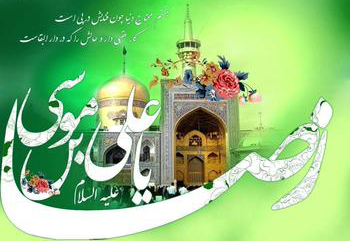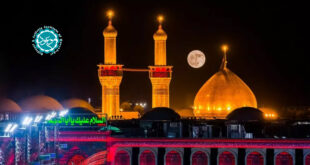Then he (al-Rida) said: `Do you permit me to enter (the room)?’ Sulaiman said to him: `May God advance your endeavour.’43 So he entered the room and stayed for about an hour after which he came out and closed the door behind him, stretched his hand above the door and said: `Where is the man from Khurasan?’ The man answered: `Here I am!’ He said: `Take these two hundred dinars, use them for your preparations for the trip; may God bring you blessings thereby, and do not spend an equal amount to it on my behalf, and leave the room in a way that I do not see you and you do not see me,’ then he left. Sulaiman then said: `May my life be sacrificed for yours! You have made quite a generous offer, but why did you hide your face?’ He answered: `I did so for fear of seeing the humiliation on the face of the man due to my assistance for him. Have you not heard the hadith of the Messenger of God (S.A.W.) in which he said: `The one who hides a good deeds receives rewards equal to performing the pilgrimage seventy times; one who announces his sin is humiliated, while one who hides it is forgiven’? Have you heard the saying of the example of the first case:
Whenever I approach him, one day, with a plea, I return home and my dignity is still with me.
for he hides himself from the person who appeals to him when he gives him something so that he does not see the humiliation on his face, and so that the pleading person retains his dignity when he does not see the face of the benevolent one who is giving him?”
He asks him to leave without seeing him in order to safeguard himself against feeling as having the upper hand over the pleading person, and in order to relieve the pleading person from having to show his gratitude to him.
While in Khurasan, he once distributed his entire wealth to the poor on the day of Arafat, so al-Fadl ibn Sahl said to him: “Now you are bankrupt!” he said: “On the contrary! I am now wealthier than ever. Do not consider trading my wealth for God’s rewards and pleasure as bankruptcy.”44
He does not give others in order to buy their affection or friendship; rather, he considers giving with generosity as a good trait whereby man gets nearer to his Maker by including His servants in the wealth with which He blessed him. This is the difference between his method of giving and the method of others. Ya’qub ibn Ishaq al-Nawbakhti is quoted saying:
“A man passed by Abul-Hassan and begged him to give him according to the extent of his kindness. He said: `I cannot afford that.’ So he said: `Then give me according to mine,’ whereupon he ordered his servant to give the man two hundred dinars.”45
The reason why the Emam abstained from giving the man according to the extent of his own kindness, as the man asked him the first time, is probably due to the fact that he simply did not have as much money as he liked to give. As regarding his own affection towards the poor and the indigent, and his way of looking after them, Mu’ammar ibn Khallad narrates this anecdote:
“Whenever Abul-Hassan al-Rida (A.S.) was about to eat his meal, he would bring a large platter and select the choicest food on the table and put on it, then he would order it to be given away to the poor. After that he would recite the following verse: `But he hath made no haste on the path that is steep.’46 After that he would say: `God, the Exalted and the Sublime, knows that not everyone has the ability to free a slave, nevertheless He found means for them to achieve Paradise (by feeding others).'”47
Thus does the Emam sense the weight of deprivation under which the poor moan and suffer; therefore, he shares his best food with them in response to the call of humanity and kindness and in harmony with the spirit of the message with which God entrusted him.
Al-Bazanti tells the story of a letter Emam al-Rida (A.S.) wrote to his son Emam Abu Ja’fer (A.S.) which personifies the generosity and spirit of giving deeply rooted in the hearts of the Prophet’s Ahl al-Bayt (A.S.); he says: “I read the letter of Abul-Hassan Emam al-Rida (A.S.) to Abu Ja’fer which said: `O Abu Ja’fer! I have heard that when you ride, the servants take you out of the city through its small gate. This is due to their being miser so that nobody asks you for something. I plead you by the right I have upon you that every time you enter into or get out of the city, you should do so through its large gate, and when you ride, take gold and silver with you, and every time you are asked, you should give. If any of your uncles asks you for something, you should give him no less than fifty dinars, and you yourself may determine the maximum amount you would like to give; and if any of your aunts asks you for something, do not give her less than twenty-five dinars, and it is up to you to determine the maximum amount. I only desire that God raises your status; therefore, keep giving away and do not fear that the Lord of the Throne will ever throw you into poverty.'”48
Equity
The Emam (A.S.) did not have the chance to rule for any period of time so that we may discuss his practical style of government, but we can still be acquainted with that through reviewing his statements to some of his followers who very much desired that the Emam should shoulder the responsibilities of caliphate. Muhammad ibn Abu ‘Abada asked him once: “Why did you delay executing the order of the commander of the faithful and why did you refuse to oblige?” He said: “Be careful, O father of Hassan! The matter is not so.” He added saying that the Emam noticed that he was crossed, so he said: “What’s in it for you anyway? Should I, as you presume, become what you wish me to become, and you are as close to me then as you are right now, you would certainly be responsible for paying your dues and, in my eyes, there would be no difference between you and anyone else.”
He, peace be upon him, clarifies the matter, and that there is no use to accept the caliph’s offer since government will never actually be under his control. And when he notices the bitterness on the face of the person who asked him why he hesitated to accept the caliph’s offer, he reminds him of his method of government should it at all be in his hands, summarizing it thus:
Nobody shall have any distinction over other citizens according to the dictates of the equitable government set up by Islamic Shari’a regardless of class or any other distinctions such as favouritism, friendship or support; rather, all subjects are equal in the rights they enjoy without any bias to one in preference over another, or any bias against one in order to please another.
The Emam’s way of explaining his method of government is actually an outspoken way of criticizing the ruling methods followed then the foundations of which were not based on justice and equity but on special interests which guarantee for the ruler and his followers the continuity of his government and authority. The wealth, lives, possessions and everything else under the government’s control was all subject to the whims and desires of the oppressive ruler and his train, distant from the principles of justice and the norms of equality secured by the Islamic message as embedded within its humanitarian method of legislation.
 Mouood Mouood English Edition
Mouood Mouood English Edition




